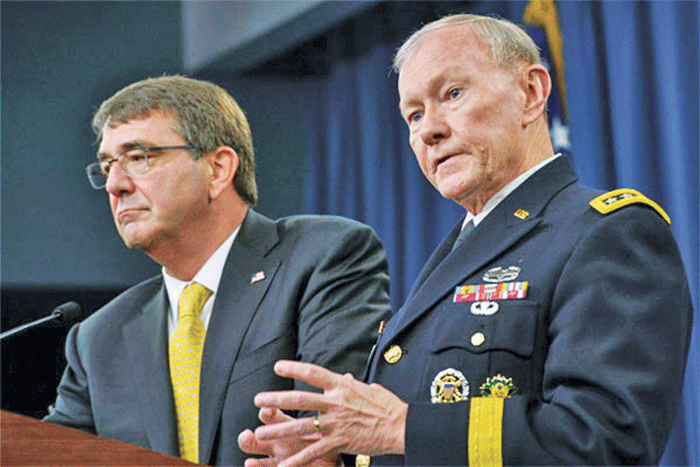
DAMASCUS — Syrian army bombing in the mountainous area along the border with Lebanon killed dozens of insurgents and helped regain hilly territory overlooking Hezbollah strongholds, the Lebanese group said on Thursday.
For years, hideouts in the Qalamoun mountains have allowed al-Qaeda-linked insurgents to attack Syrian soldiers and fighters from Hezbollah, a staunch ally of Syrian President Bashar al-Assad, along miles of borderland in eastern Lebanon.
The Syrian military backed by Hezbollah fighters captured the strategically important territory known as Assal al-Ward on the Syrian side of the border, after retaking Qarna Heights, a Hezbollah official told Reuters, both in the 60-mile Qalamoun range.
Some insurgents were from al Qaeda’s Nusra Front, he said.
Hezbollah’s leader Sayyed Hassan Nasrallah vowed on Tuesday that his forces and Syrian allies would clear the rebels out of the border region north of the capital Damascus that insurgents use as a main supply route for arms and fighters.
Although he did not disclose when his fighters would start a major assault in the Qalamoun area, his group said on Wednesday that its fighters had hit a gathering of militants on the Syrian side of the border, inflicting heavy casualties.
On Wednesday, Hezbollah said its fighters had retaken part of a hilltop in Lebanon’s eastern border area known as Kherbat al-Nahla overlooking the Syrian side of Qalamoun.
But rebel group Jaish al-Fatah Qalamoun said on social media sites they had repelled the assault, which Hezbollah has been rumored to have been planning for months.
Assad vows to fight back
Assad said on Wednesday that troops would head to an insurgent-held town to help besieged soldiers holed up on its outskirts and said army setbacks were part of normal warfare.
Last month Islamist insurgents including al Qaeda’s wing in Syria, Nusra Front, captured the town of Jisr al-Shughour in Syria’s Idlib province, edging closer to the government-held heartland of Latakia along the coast.
“And now, God willing, the army will arrive soon to these heroes who are besieged in the Jisr al-Shughour Hospital to continue the battle to defeat the terrorists,” he said in comment broadcast on Syrian state television.
He was speaking at a school in an undisclosed location at an event to commemorate Syria’s Martyrs’ Day. In the rare public appearance, he was surrounded by throngs of people chanting in support. Security officials held back surging crowds.
In his first remarks since the insurgents seized Jisr al-Shughour, and the city of Idlib at the end of March, Assad played down such setbacks, saying to-and-fro gains were normal in any war, adding the armed forces would remain resolute.
“Psychological defeat is the final defeat and we are not worried,” he said.
Assad said while the army was waging a relentless war across swathes of territory and gaining ground, there were occasions when the fighters had to “retreat back when the situation warrants.”
U.S. training
The United States has begun a long-awaited program to train Syrian fighters to go into combat the “Islamic State”, the Pentagon said on Thursday, deepening America’s role in Syria’s civil war after eight months of airstrikes against the terrorist group.
Defense Secretary Ash Carter said the military was starting small, training a first group of just 90 Syrians, who would be paid a stipend and could expect some still-undefined support once they return to the battlefield.
A spokesman for the government of Jordan said the training began there several days ago and U.S. and Middle Eastern sources told Reuters the training would soon start at another site in Turkey.
Syrian rebels and members of the U.S. Congress are deeply skeptical, with some lawmakers saying the program is too small and slow. The Pentagon forecasts it will take three years to train and arm more than 15,000 opposition forces.
Carter acknowledged that it would be a few months before even the first group of 90 fighters would be deployed and he described the effort as advancing with tremendous caution, in part to limit the risks that U.S.-trained fighters would commit human rights violations.
“We’re starting with the people that we have that we’ve vetted very carefully,” Carter told a Pentagon news briefing.
The Obama administration says the program aims only to target Islamic State forces, since the United States is not at a war with Syria. But critics say that theoretical limitation is unlikely to withstand the realities of Syria’s messy civil war.
U.S.-trained Syrian fighters, experts say, are likely to come in contact with Syrian government forces eventually. And the priority of U.S. allies in the region, including Saudi Arabia and Turkey, is to topple Assad.






Leave a Reply